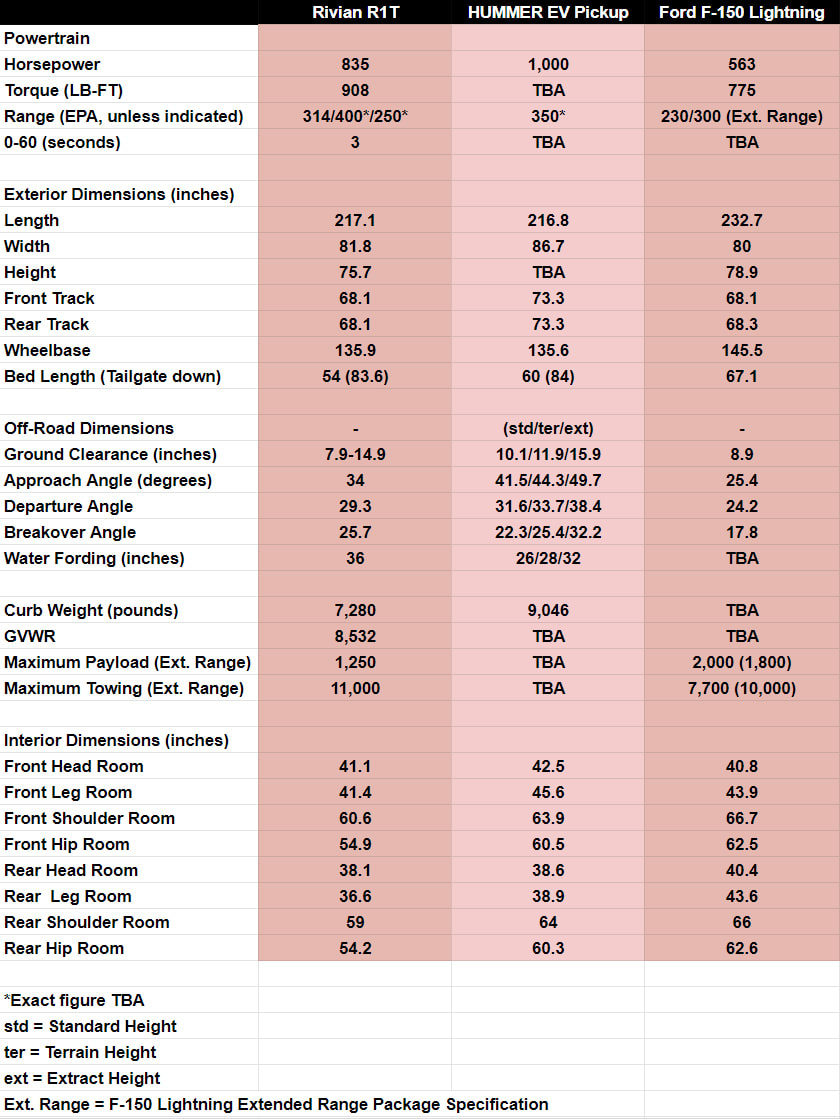The 2022 Rivian R1T has arrived, ushering in the era of the production electric pickup truck. The Rivian reviews are in, and spoiler alert: They’re pretty good. Curious how the new battery-powered truck stacks up to its forthcoming competitors? Well, you’ve come to the right place.
Rivian beat all of Detroit’s big automakers to market in the half-ton segment, but probably not by the margin the startup would have liked. Ford’s answer is the F-150 Lightning, which is due to enter production early next year, coming hot on the heels of GM’s first entry into the space – the GMC Hummer EV pickup – which is scheduled to come off the line late this fall. While all three are pickups, they’re aimed at distinctly different buyers, as a perusal of their specifications will reveal. Let’s have a look, shall we?
Disclaimer: Before we dive in on this one, we’d like to note that while we’ve made our best effort to verify the specs provided, the Rivian is brand-new and the others are still in the prototype phase. Some of these figures may be inaccurate or may simply change before production. This is all hypothetical until you can actually cross-shop them anyway, right? Cool. End disclaimer.
Let’s start with the powertrains. They’re all battery-electric trucks engineered on a modular rear-wheel-drive configuration engineered to accommodate (theoretically, anyway) up to four electric drive units. Rivian actually makes the most use of this with a quad-motor setup producing 835 horsepower and 908 pound-feet of torque with its high-output initial model. GMC’s three-motor Hummer has the R1T beat with its estimated 1,000-horsepower output, while Ford’s (also three-motor) comes in with a far more modest 563 horses. This is an excellent illustration of our above point that these are not all engineered for the same crowd. Ford’s F-150, which comes in at a lower price point, is meant to be far more mainstream, as its power output suggests.
This theme continues when we look at the dimensions. Despite the image “Hummer” may conjure, GMC’s entry actually needs the shallowest parking space. The Rivian is right behind it, with the work-truck-spec Ford extending more than a foot longer than either. What the Hummer lacks in length, it makes up for in girth. It’s the widest by a good 5 inches. The Rivian is only slightly pudgier than the F-150, but it’s much closer at that end of the scale.
Sadly, we don’t know enough about these trucks to really speculate as to where everything will shake out in regards to weight and handling. The Rivian is certainly heavy at approximately 7,280 pounds, but neither Ford nor GMC has committed to a final weight figure. It has been suggested that the Lightning will weigh approximately 1,000 pounds more than the EcoBoost model of the F-150, or around 6,500 pounds total, which would certainly be in the ballpark. The Hummer, meanwhile, is confirmed to weigh more than 9,000 pounds, which is staggeringly heavy.
Inside, the Hummer offers the most spacious front seat, especially for those with long legs and torsos. Those with wider shoulders and hips appear to be Ford’s ideal customers, with Rivian bringing up the rear straight across the board. All three trucks employ powertrain architectures that allow for a supremely roomy cab, so none will be compromised in relation to their gasoline cousins.
As we said up top, these are three different trucks for three different buyers. We’re not sure which formula will resonate the most, but in this truck-thirsty market, we suspect each will find its niche.
How they compare in pictures
2022 Rivian R1T

